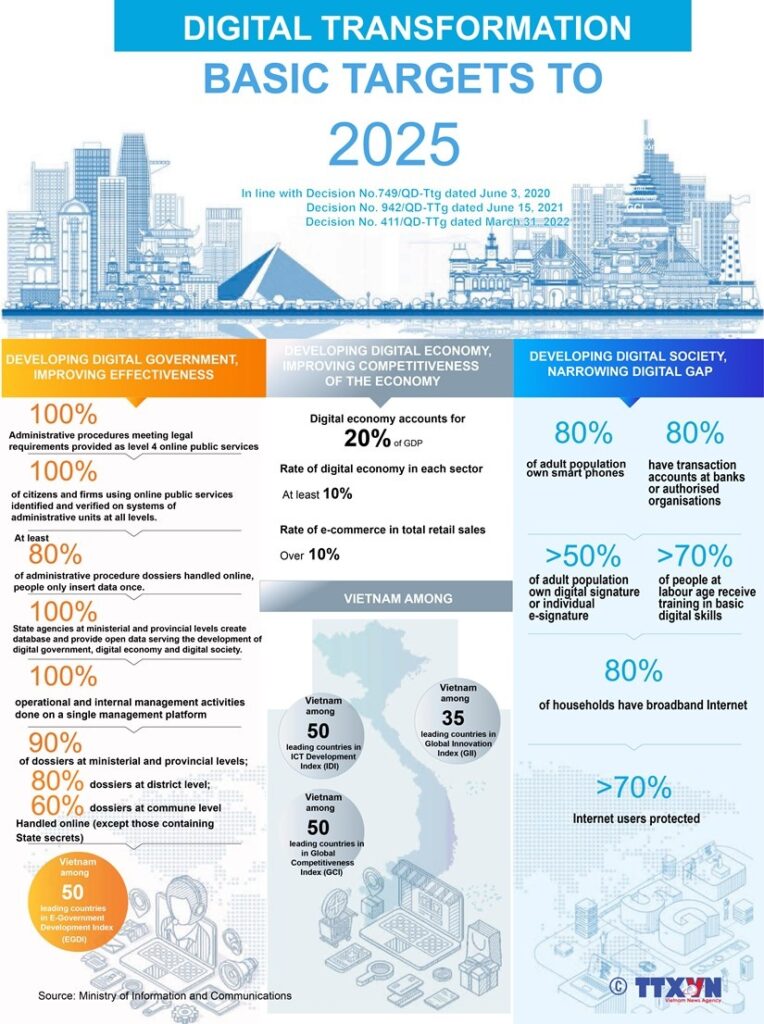Top Digital Transformation Trends in 2025
As businesses strive to stay competitive in an increasingly digital world, digital transformation trends are shaping the strategies and technologies that define success. In 2025, these trends are not just innovations but necessities driving efficiency, customer satisfaction, and growth across industries.
As a leading software development company, Savvycom empowers businesses to adopt and implement these digital transformation trends seamlessly. Whether it’s leveraging AI for operational efficiency, integrating IoT for smarter systems, or implementing secure cloud solutions, Savvycom ensures organizations stay ahead in the digital race. This article dives into the most transformative trends expected to dominate in 2025, with insights, examples, and actionable takeaways.
What Is Digital Transformation?
Digital transformation refers to the comprehensive integration of digital technologies into all facets of an organization, fundamentally altering how businesses operate and deliver value to customers. This transformation goes beyond mere technological upgrades; it encompasses a cultural shift that encourages organizations to continually challenge the status quo, experiment with new approaches, and adapt to evolving market demands. The primary objective of digital transformation is to enhance efficiency, improve customer experiences, and foster innovation. By leveraging technologies such as cloud computing, artificial intelligence (AI), the Internet of Things (IoT), and data analytics, businesses can streamline operations, make informed decisions, and create new value propositions.
Digital transformation trends are the emerging patterns and directions that organizations follow when adopting and implementing digital technologies. These trends highlight the technologies, strategies, and methodologies gaining traction and shaping the future of business operations. Hence, staying abreast of these trends is crucial for businesses aiming to maintain a competitive edge.

Digital transformation basic targets to 2025 by TTXVN
Top 5 Digital Transformation Trends in 2025
By understanding and adopting relevant trends, organizations can anticipate market shifts, meet evolving customer expectations, and drive sustainable growth.
1. AI Becomes Ubiquitous
By 2025, Artificial Intelligence (AI) will no longer be a luxury – it will be a necessity. Businesses across industries are leveraging AI not only for operational efficiency but also to deliver hyper-personalized customer experiences and actionable insights.
Key Developments in AI:
- Generative AI Evolution: Tools like ChatGPT-5 and MidJourney are transforming marketing, customer support, and content creation, producing human-like interactions and creative outputs.
- AI-Augmented Workforce: AI will assist employees by automating repetitive tasks, freeing them for strategic decision-making.
- Predictive Maintenance: Industries like manufacturing and logistics are using AI to reduce downtime by predicting equipment failures with high accuracy.
Pro Tip: Companies aiming to lead in AI adoption should focus on specialized use cases tailored to their business needs, like AI-enhanced supply chains or predictive analytics for customer behaviors.
2. Digital Twins Revolutionize Operations
The concept of digital twins – virtual replicas of physical systems – has matured into a mainstream tool for innovation. By 2025, digital twins are expected to revolutionize industries by improving efficiency, enhancing predictive capabilities, and reducing waste.
Key Developments in Digital Twins:
- Healthcare: Digital twins of patients enable precise, personalized treatment plans, accelerating recovery rates.
- Smart Cities: Urban planners use digital twins to optimize traffic flow, energy consumption, and public services.
- Manufacturing: Real-time simulations allow manufacturers to tweak production lines for maximum efficiency.
3. Hyperautomation Expands Across Industries
Hyperautomation, the combination of advanced technologies like AI, robotic process automation (RPA), and machine learning, will redefine operational efficiency in 2025.
Why Hyperautomation is a Game-Changer:
- End-to-End Processes: Businesses can fully automate workflows, from customer onboarding to inventory management.
- Scalable Growth: Hyperautomation allows organizations to scale operations without proportionally increasing costs.
- Real-Time Decision Making: Advanced analytics integrated into automated systems provide actionable insights instantly.
4. Quantum Computing Hits Mainstream Use Cases
Quantum computing, once confined to research labs, is poised to tackle real-world challenges in 2025. This transformative technology is expected to disrupt industries requiring complex problem-solving.
Potential Impact Areas:
- Financial Modeling: Banks can perform risk analysis and fraud detection with unparalleled precision.
- Pharmaceutical Research: Accelerating drug discovery by simulating molecular interactions.
- Global Supply Chains: Solving logistical challenges involving massive datasets and variables.
Looking For a Trusted Tech Partner?
We’ll help you decide on next steps, explain how the development process is organized, and provide you with a free project estimate.
5. Sustainability-Driven Digital Transformation
Sustainability is no longer an afterthought – it is central to digital transformation strategies in 2025. Environmental, Social, and Governance (ESG) goals are now intertwined with business growth and technological adoption.
Key Developments in Sustainable Tech:
- Green Cloud Computing: Data centers are adopting renewable energy sources and energy-efficient hardware.
- IoT for Waste Management: Sensors and data analytics optimize waste collection and recycling processes.
- Sustainable AI: Reducing energy consumption in AI model training and operations.
Actionable Insight: Companies that incorporate ESG principles into their digital transformation strategies are more likely to attract investors and retain environmentally conscious customers.
6. 5G and 6G Revolutionizing Connectivity
While 5G adoption is already widespread, the development of 6G is expected to unlock even greater possibilities by 2025, including ultra-low latency, higher bandwidth, and seamless connectivity.
Why 5G/6G Adopting is a Game-Changer:
- IoT at Scale: Managing billions of connected devices, from home appliances to industrial equipment.
- Enhanced AR/VR Experiences: Transforming industries like healthcare (remote surgeries) and retail (virtual shopping).
- Smart Workplaces: Enabling real-time collaboration through ultra-high-speed networks.
Forecast: The global 5G IoT market is expected to surpass $40 billion by 2025 (Statista), underlining its transformative potential.

7. Cybersecurity Takes a Proactive Approach
As digital ecosystems grow, so do cyber threats. By 2025, cybersecurity strategies will shift from reactive to proactive, leveraging AI and automation to counter increasingly sophisticated attacks.
Key Developments in Cybersecurity:
- Zero Trust Frameworks: “Never trust, always verify” becomes the standard for network security.
- AI-Driven Threat Detection: Identifying anomalies in real-time to mitigate breaches before they occur.
- Post-Quantum Cryptography: Preparing for future threats posed by quantum computing.
Forecast: Cybercrime damages are projected to hit $10.5 trillion annually by 2025 (Cybersecurity Ventures), highlighting the critical need for robust security measures.
8. The Democratization of Technology
The rise of low-code and no-code platforms empowers non-technical users to build applications, automating processes and fostering innovation across organizations.
Why Democratized Tech Adopting is a Game-Changer:
- Faster Development: Applications can be created in days rather than months.
- Cost Savings: Reducing the need for specialized developers.
- Increased Accessibility: Teams across departments can contribute to digital initiatives.
Why Digital Transformation Trends Matter
Understanding and embracing digital transformation trends are vital for several reasons:
-
Competitive Advantage: Early adopters of new technologies can differentiate themselves in the market, offering unique value propositions that set them apart from competitors.
-
Operational Efficiency: Implementing the latest digital tools can streamline processes, reduce costs, and enhance productivity.
-
Customer Expectations: As technology evolves, so do customer expectations. Staying updated with trends ensures that businesses can meet and exceed these expectations, leading to improved customer satisfaction and loyalty.
-
Innovation: Digital transformation fosters a culture of innovation, enabling organizations to develop new products, services, and business models.
-
Resilience: In an ever-changing business environment, being adaptable to digital trends ensures that organizations can respond effectively to disruptions and challenges.
FAQs: More About Digital Transformation Trends
Why is cybersecurity a recurring trend in digital transformation?
With the increasing reliance on digital platforms, businesses face heightened risks from data breaches, ransomware, and phishing attacks. As cyber threats evolve, robust cybersecurity measures ensure data integrity, compliance with regulations, and customer trust. For example, implementing zero-trust security models and leveraging AI-driven threat detection are critical for businesses in 2025.
How do digital transformation trends impact customer experience?
Emerging trends like hyper-personalization and omnichannel engagement significantly enhance customer experiences. By leveraging data analytics and AI, businesses can anticipate customer needs, provide tailored recommendations, and ensure seamless interactions across platforms, leading to higher satisfaction and loyalty.
What are the first steps to adopt digital transformation trends?
To effectively adopt digital transformation trends, businesses should:
- Assess their current digital maturity: Identify gaps and opportunities.
- Define clear objectives: Align transformation initiatives with business goals.
- Choose the right partners: Collaborate with experts like Savvycom to ensure effective implementation of technologies such as cloud computing, IoT, and AI.
Want to explore more about predictions of digital transformation trends worldwide? Watch this video for more:
Final Thought: Let Us be Your Partner in Digital Transformation
By recognizing the importance of digital transformation trends, businesses can strategically plan and execute initiatives that not only keep them relevant but also position them as leaders in their respective industries. Savvycom is a top IT provider in Vietnam, helping organizations navigate these digital transformation trends with tailored solutions. From AI integration to cybersecurity, our team delivers high-value, scalable strategies to future-proof your business.
Tech Consulting, End-to-End Product Development, Cloud & DevOps Service! Since 2009, Savvycom has been harnessing digital technologies for the benefit of businesses, mid and large enterprises, and startups across the variety of industries. We can help you to build high-quality software solutions and products as well as deliver a wide range of related professional services.
Savvycom is right where you need. Contact us now for further consultation:
- Phone: +84 24 3202 9222
- Hotline: +1 408 663 8600 (US); +612 8006 1349 (AUS); +84 32 675 2886 (VN)
- Email: [email protected]


